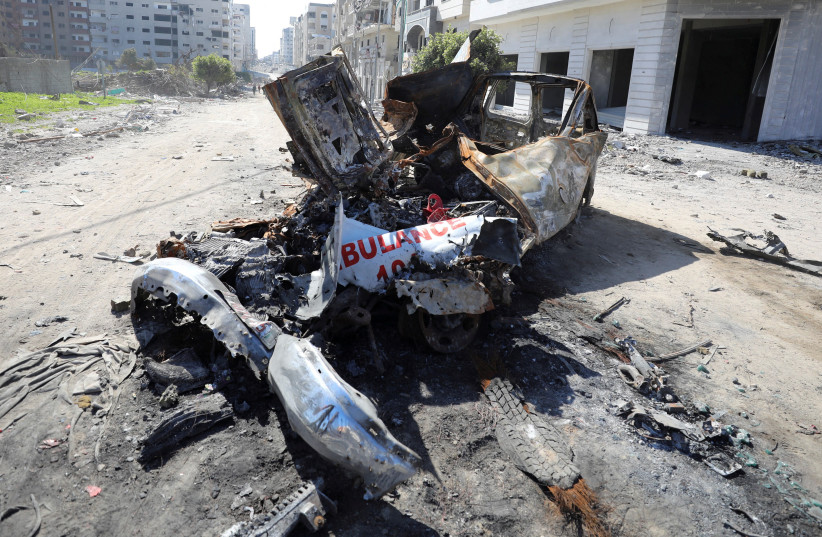There is a saying that time is money.
In geopolitics, time can mean the difference between keeping weapons support, diplomatic support, and public relations support or losing it.
On Tuesday, The Washington Post published a heartbreaking story about the killing of six-year-old Hind Rajab in Gaza City on January 29.
After the incident, the IDF responded that it was not in the area, a response the military reiterated to The Jerusalem Post on Wednesday.
And the truth is critics of Israel often accuse the IDF of incidents when it is clear that the IDF was not in the area and could not have been involved.
On October 17, Hamas and much of the global media accused Israel of attacking the al-Ahli Arab Hospital, killing around 500 patients and civilians.

On October 18, IDF Spokesman R.-Adm. Daniel Hagari laid out the IDF’s full comprehensive intelligence case to prove that a failed rocket launched by Palestinian Islamic Jihad in Gaza was the cause behind the damage to the hospital car park and some 50 deaths at the hospital.
On April 8, the Shin Bet (Israel Security Agency) and IDF intelligence Unit 504 revealed that Palestinian Islamic Jihad spokesman Tarik Salame Uda Abu confessed to falsely blaming Israel for the incident.
This is just one of many such cases.
But the case of Rajab is different.
The Washington Post story is thorough and includes reviews by ballistics and weapons experts who have no horse in the race.
The record shows that Rajab was alive and talking to family members and outside helpers for several hours.
Alone in the backseat of a car outside a Gaza City gas station, the report describes her “drifting in and out of consciousness, surrounded by bodies, as she told emergency dispatchers that Israeli tanks were rumbling closer.”
According to the report, the Palestine Red Crescent Society (PRCS), some 80 kms. away in the West Bank city of Ramallah sent paramedics to help her, but they were killed along the way.
Twelve days later, when Palestinians finally reached the area, the report said they found Rajab’s body along with five family members, in a car riddled with bullets, according to her uncle, Samir Hamada, who also arrived at the scene early that morning. The report said that the ambulance lay charred roughly 50 meters away from the car, its destruction consistent with the use of a round fired by Israeli tanks, according to six munitions experts.
Moreover, the report cited Steven Beck, an acoustic analyst who consulted with the FBI for more than a decade, who found that the number of rounds per minute fired was faster than an automatic AK-pattern rifle, which Hamas fighters often use, and was more in line with weapons used by the IDF.
In addition, the report said that a satellite image captured by Planet Labs roughly an hour later, at 3:31 p.m., shows at least four Israeli armored vehicles around 300 meters up the road from the girls.
US State Department Spokesperson Matthew Miller said on Tuesday that he will ask Israel for more information about the incident, calling for a more comprehensive probe after The Washington Post report cast doubt on the IDF’s earlier explanation.
“We’re going to go back to the government of Israel and ask them for further information,” Miller said at a press briefing, calling Hind Rajab’s death “an unspeakable tragedy, something that never should have occurred. We would still welcome a full investigation into this matter and how it occurred in the first place.”
And the IDF is not perfect.
Previous case during the 2008-9 Gaza conflict
During the 2008-9 Gaza conflict, an initial report published by the IDF and the Foreign Ministry stated that a specific mosque was not attacked by the IDF because there were no IDF forces in the area.
A later report, after additional information provided by third parties, led the IDF to reverse its conclusion and admit to attacking the mosque.
In between, one of the investigators had confused different details and incidents, and no one else had caught it in the haze of so many incidents being probed following that conflict.
It is still possible that Hamas accidentally killed the girl.
We know that at certain stages of the war, around 12% of Gazan rockets misfired and struck Palestinians.
But in this case, the additional evidence makes it look more like the case of the 2008-9 mosque, than the October 17 Ahli Hospital incident.
It seems likely that the IDF made an error in real-time and in its initial probe and response.
If that is true, then correcting those errors within days, not months, could be the difference between severely damaging Israel’s already hammered legitimacy worldwide or being seen as an imperfect democracy that quickly corrects and confesses errors.
Put bluntly, it could be the difference between a tragic mistake, like the World Central Kitchen incident, or a cover-up.
The WCK incident showed Israel could master details and rush them out to the world in a matter of days.
Doing so in this and other high-profile incidents could, beyond being ethical, go a long way toward maintaining legitimacy and allied support.
